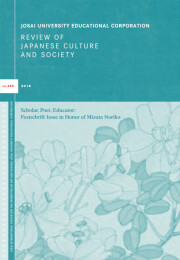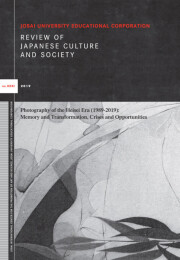Issue 30, 2018- Scholar, Poet, Educator: Festschrift Issue in Honor of Mizuta Noriko
“One of Noriko’s brilliant endeavors was to imagine, and then bring about, a truly unique new educational institution in Japan, namely Josai International University. On my first visit to Japan in 1987 for the Japanese publication of Women in Film Noir, Noriko mentioned that she hoped Josai University could build on available land near Tokyo Airport. But it was just a dream. Only a few years later, however, Josai International University was up and running, bringing life and energy to the Chiba area. The buildings were beautifully designed and organized, and a delight to be in. Despite already being Vice Chancellor of the long established Josai University Educational Corporation, Noriko became President of Josai International University from 1996 to 2009 (She then became Chancellor of Josai University Educational Corporation from 2004 to 2017). Her masterstroke was to make this new International University unique in combining degrees in Business Studies with an M.A. in Women’s Studies. This was a time when there were very few Women’s Studies degrees being offered in Japan, so Noriko was charting new ground, perhaps partly inspired by American feminist research. I was honored to be invited to teach the first courses at Josai on Women and Film. At first I thought this was to be just for the one year, 1994; however, to my surprise and delight, Noriko in fact had arranged for me to teach a course or two once a year for four consecutive years.” Excerpt from, In Honor of Noriko Mizuta by E. Ann Kaplan
Issue 30 also includes:
In Her Footsteps: The Legacy of Professor Mizuta Noriko by Linda Flores
Mizuta Noriko by Ueno Chizuko, James Garza
Mizuta Noriko: Biocritical Essay of a Literary Feminist and Global Scholar by Alisa Freedman
Mizuta Noriko: Selected Bibliography by Linda Galvane, Rebecca Corbett
Feminine Failure and the Modern Hero: Mad Women in Sylvia Plath’s The Bell Jar and Joan Didion’s Play It As It Lays by Mizuta Noriko
Natsume Sōseki on Poe by Mizuta Noriko
Literature, Ideology and Women’s Happiness: The Autobiographical Novels of Miyamoto Yuriko by Mizuta Noriko
Women’s Self-Representation and Transformation of the Body: Kōno Taeko and Ogawa Yōko by Mizuta Noriko
Beyond Home And City: Poems By Ishigaki Rin And Shiraishi Kazuko by Mizuta Noriko and Eiji Sekine
The Desolate Self and Its Circular Search for The Absolute Other: Transgression and Dream in the Work of Takahashi Takako by Mizuta Noriko and Alessandro Castellini
When Women Narrate the Self: Personal Narratives in Modern Women’s Literaturebby Mizuta Noriko and Nadeschda Bachem
The Dream of the Yamanba—An Overview by Mizuta Noriko and Luciana Sanga
The Girl Double: On the Shōjo as Archetype in Modern Women’s Self-Expression by Mizuta Noriko and James Garza
Urashimasō: Memory as Trauma and Recovery in Literature by Mizuta Noriko and Hannah Osborne
Aesthetics and the Archive: The Poetry of Mizuta Noriko by Jordan A. Y. Smith
Selected Poems by Mizuta Noriko by Jordan A. Y. Smith
Dear Kojien Dictionary: Tomorrow Girls Troop by Reiko Tomii
Issue 31, 2019- Photography of the Heisei Era (1989-2019): Memory and Transformation, Crises and Opportunities
“In this introductory essay, I frame and contextualize shifts in the practices of Japanese photography during the Heisei era, examining how new themes and changing subjects of self-presentation, the dramatic change in power relations, responsibility, and political valence, and a new assortment of artists, multiple new subjects, and iconographies appeared on the stage and rose to prominence. This text primarily focuses on a single aspect of the changes that took place in photography and video art during the Heisei period, not as an established corpus or a specific canon, but as a process that defines itself through the multiple changes of that era. My appraisal of this process centers on the relationship between the photographer and the photographed, highlighting problems of identity and representation, as they appear in the works that are discussed throughout this issue. In this context, the present essay emphasizes the crucial changes enacted by the growing participation of women photographers, who have contributed to the rise of imagery related to marginalized subjects and have taken on a prominent role in defining the terms of photographic practice, such as the acknowledgement of minority groups, an openness toward sexual and gender identities, and a new legitimization of traditionally domestic subjects, such as old age, family, motherhood, etc.” Excerpt from the Introduction: Between the Viewfinder and the Lens—A Journey into the Performativity of Self-Presentation, Gender, Race, and Class in Heisei Photography (1989–2019) by Ayelot Zohar
Also in issue 31:
Preface: A Difficult New Dawn by Frank Feltens
Yoneda Tomoko by Lena Fritsch
Twice Infinity: Sugimoto Hiroshi’s Architecture Series by Jonathan M. Reynolds.
Ghost in the Shell: An After-Thought on Pierre Huygue’s Human Mask by Michio Hayashi
Watanabe Toshiya by Kakishima Takashi
The Predicament and the Reflexive Turn: Japanese Street Photography since 1990 by Yoshiaki Kai
Cardboard Houses and Miyamoto Ryūji’s Visualization of Alternative Urban Realities in Heisei Japan by Carrie Cushman
Kitano Ken by Ishida Katsuya
Sudo Ayano’s Portrait Photography: Artificially Modified Beauties and the Uncanny by Nava Astrachan
The Position of Ninoshima by Kuraishi Shino, Ellen Takata, Jason Beckman, and Mikiko Hirayama
Linking Disaster to Natural History, A Visit to Sasaoka Keiko’s Exhibition: Tanesashi, Ninoshima (Hachinohe City Museum of Art) by Kuraishi Shino and Daryl Maude
The Story of Two Women: Ishiuchi Miyako and Iwasaki Chihiro (Excerpts from a Conversation between Ishiuchi Miyako and Ueno Chizuko—On Mother’s and Hiroshima) by Tajima Miho, Ayelet Zohar, and Frank Feltens
Arai Takashi and Nagashima Yurie through the Historical Frame of “Japanese Photography” by Nakamura Fumiko, Mai Hayano, and Kevin Niehaus
Photography as Embalming: Yokota Daisuke’s Post-Production Process by Hoshino Futoshi
A Memorandum on the Photograph: Movement and Time in Blurs and Stills and Kanai Mieko and Hannah Osborne
The Story of The Inflated Man by Kanai Mieko and Hannah Osborne
Postwar Japanese Photography: A Selected Bibliography by Thomas F. O’Leary, Anat Icar-Shoham, Patricia Lenz, and Shir Yeffet
To subscribe to Review of Japanese Culture and Society, please visit the journal homepage.
University of Hawai‘i Press
Journals Customer Service
Toll-free (U.S. & Canada): Tel. 1-808-956-8833
Fax 1-808-988-6052
Tel. 1-888-UHPRESS Fax 1-800-650-7811
twitter @uhpressnews || Insta
Facebook /






